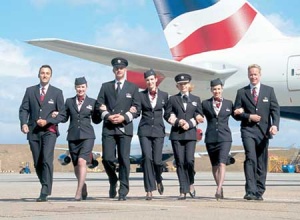Editor’s Blog: United they fall

Could the latest industrial action by the Unite union mark the end of their long running dispute with British Airways?
Surely 20 days of strikes during the school half-term, and perilously close to the all important World Cup in South Africa, will tip public sentiment toward an already cherished British Airways?
But perhaps not.
Unite has called the 12,000 plus cabin crew it represents at the British flag-carrier out on strike twice already this year, and travellers stoically accepted the results as their lot, grimly trudging to their destinations through a barrage of delays and cancellations.
Perhaps Unite joint general secretaries Derek Simpson and Tony Woodley are counting on this public indifference in order to launch such a brazen attack on the airline - out of proportion to any dispute, let alone one where a pay offer addressing the concerns of members is on the table.
However, the longer the dispute rumbles on, the pettier Unite begin go to look. The cabin crew they represent at British Airways are already among the best paid in the industry, have had to accept no redundancies and have a luxurious set of perks on offer.
So what is Unite hoping to prove?
Originally the dispute was about pay and conditions. New working practices implemented by British Airways saw the number of cabin crew on some long-haul flights fall – by one – while new recruits at the airline are now offered modified contracts.
But these concerns seem to have become lost in the mire as the battle becomes increasingly personal.
Following the first round of strikes British Airways permanently removed the travel perks of employees involved in the industrial action. Unite is seeking the reinstatement of these benefits as a condition of any deal. However, this appears to be a price the union is going to have to accept for the disruption caused to date, with BA chief executive Willie Walsh declaring the decision is irrevocable.
One element of hope centres on the cabin crew who crossed picket lines during the March strikes. Although roughly 80 per cent of Unite members voted in favour of strike action, many seem to have baulked at the aggressive stance adopted by the union, choosing to return to work. This allowed the airline to operate the majority of its services from London Gatwick and London City airports, while Heathrow was far from deserted. British Airways can only hope the latest strikes encourage an even great number of staff to turn up for work.
Another chink of light is the potential incoming Conservative government. Gordon Brown’s Labour government was essentially bankrolled by the Unite union, making it incredibly difficult for the prime minister to convincingly attack the Unite position. With David Cameron in Downing Street – without or without the support of the Liberal Democrats – this implicit support for the union is removed.
With cracks appearing in the Unite lines – and British Airways sitting on huge cash reserves and a fair dose of public goodwill – it can only be hoped this bitter dispute its bought to a conclusion ahead of May 18th.

